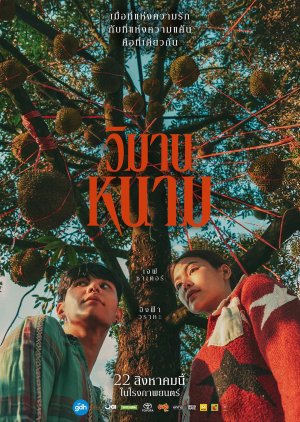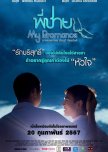Must watch film!
"The Paradise of Thorns" is a powerful depiction of Thai society's deep-seated issues, with a particular focus on marriage inequality. The film excels in its storytelling, blending intense drama with cultural commentary. The acting is superb, bringing the characters' struggles and emotions to life in a way that feels both genuine and compelling. Coupled with some of the best cinematography in recent Thai cinema, the film creates a visually stunning yet thought-provoking experience. The film's original soundtrack beautifully complements the emotional depth of the story, enhancing the overall impact of the narrative. It's an exceptional piece of filmmaking that resonates on multiple levels, making it the best Thai film for me.Cet avis était-il utile?
Fruits of Sorrow: Love's Tangled Roots in 'Paradise of Thorns
In the lush embrace of a remote durian orchard, "The Paradise of Thorns" unfolds like a bittersweet fruit, its story as complex and layered as the Thai landscape it inhabits. This poignant Thai film weaves a tapestry of love, loss, and legal strife, centering on Thongkam and Sek, a gay couple whose shared life is abruptly severed by tragedy.As the fragrant durian blossoms wither, so too does Thongkam's world when Sek passes away. The orchard, once a sanctuary of their love, becomes a battleground of grief and ownership. Thongkam must navigate the thorny path of reclaiming what he believes is rightfully his, while the absence of legal recognition for their union casts a long shadow over his fight.
The film's brilliance lies in its nuanced portrayal of five key characters, each a prism refracting different hues of love and loss:
Thongkam, portrayed with raw emotion by Jeff Satur, stands as the heart of the story. His endurance in the face of hardship is as steadfast as the durian trees he tends, his love for Sek rooted deeply in the soil of their shared dreams.
Mo, brought to life by Engfa Waraha, initially appears as thorny as the durian's husk. Yet, as the layers peel away, we see a woman equally scarred by love's cruel hand, her devotion to Saeng a testament to love's many forms.
Sek, played with complexity by Toey Pongsakorn Mettarikanon, embodies the conflict between desire and duty. Like a durian split open, his character reveals the sweet and the bitter - a man torn between his true self and societal expectations.
Saeng, masterfully portrayed by Seeda Puapimon, is like the roots of the durian trees - hidden yet vital. Her journey from seeming selfishness to revealed vulnerability mirrors the ripening of the fruit itself, her love emerging too late, but no less potent.
Jingna, brought to life by Keng Harit Buayoi, serves as the film's conscience. Like a bird's-eye view of the orchard, he sees all, his perspective offering a bittersweet wisdom on the cost of blind pursuit.
"Paradise of Thorns" transcends its initial premise of LGBTQ rights, blossoming into a universal meditation on love's many facets. It reminds us that in our struggle to claim what we believe we deserve, we may lose sight of what truly matters.
Set against the rustic beauty of Mae Hong Son, the film whispers that these tales of love and loss are as universal as the seasons. From Bangkok's bustling streets to the quiet durian groves of the north, human hearts beat to the same rhythm of joy and sorrow.
In the end, "Paradise of Thorns" leaves us with a profound truth: sometimes, in life's orchard, we open what we believe to be the sweetest fruit, only to find bitterness within. Yet it's in accepting this duality that we truly taste the richness of the human experience.
Cet avis était-il utile?

Cette critique peut contenir des spoilers
A bit chaotic (Spoiler alert!)
I am a foreigner who lives in Thailand for some time and I went to the movie theater to watch this movie. Thai media have been talking about it for a while and I was curious to see what Naruebet Kuno (the same director of I Told Sunset About You - ITSAY) was going to do here.I can say I have mixed feelings about the overall result. Kuno is still very good in cinematography. The photography in this movie is so pretty and eye catching as in ITSAY, but we have here the same problem we had in ITSAY also: it is a bit overdramatic in some points. Don't get me wrong, I really like ITSAY, but I have the feeling that episode 4, for example, was a bit too much in terms of emotions. The same thing happens in Paradise of Thorns. The first 2/3 parts of the movie are more balanced, but the last 1/3 looks like somehow a stereotyped Latin American Soap Opera.
It is important to say that the story doesn't talk much about the inequality brought by the lack of recognition of gay rights by the State. This is not an LGBTQIA+ agenda movie (which is not necessarily bad). This topic is just a starting point for the main issue: The fight between the characters for possession of the lands where the Durians are planted. Basically, all the characters are pretty f*cked up and they see the Durians as their gold ticket. The cast is pretty convincing, specially the four main actors and actresses: Jeff Satur, Engfa Waraha, Harit Buayoi and Seeda Puapimon.
Thongkham (Jeff Satur) and Mo (Engfa Waraha) are the main rivals, as they dispute the preference of Saeng, the new owner of the land after her son's death. Saeng is a greedy and arrogant old woman who likes to see Thongkham and Mo humiliate themselves to please her, while Jingna (Harit) is the handsome Mo's brother who comes to work in the farm and falls in love with Thongkham. Jingna and Thongkham's relationship is sweet and charming, but not that well developed. This is probably one of the problems in the movie, although it didn't bother me that much. Some people also might think that the "greedy topic" is not so developed also. I would agree. What is this movie about? Love? Greedy? Selfishness? Rivalry? A love triangle? Maybe a bit of all of this? Well, when you try to put so many things together, maybe you might fail to develop so many topics at the same time. This might have happened here.
The rivalry between Mo and Thongkham grows to the point where they commit atrocities. Mo kills Saeng and makes the old woman sign a declaration before she dies, transferring the land to her name. Mo tries to expel Thongkham from her new possession, but he reacts and tries to r4pe her. The scene is full of screams and violence. Like a real Mexican soap opera! When the two are about to resolve their problems, Mo's new husband appears and tries to kill Thongkham, who is saved by his boyfriend, Jingna. In the middle of this confusing fight scene, Jingna ends up being killed too. With that, Thongkham loses the second love of his life. Tragic as a Greek tragedy!
My biggest disappointment with the film was not that it ended with the death of a beloved character (Jingna was perhaps the only character with any integrity in this whole story), but the fact that it was a very cliché ending. Before the husband showed up and tried to kill Thongkham, the first thing I thought was: "I hope they don't end the film with the husband showing up and killing someone." Well, that's exactly what happened. I thought it was an uncreative ending. More of the same.
Paradoxically, I still enjoyed watching the film. I should have hated it, but I didn't. The thing is: this movie makes you get the feeling that you're watching something with flaws here and there, but when you put it all together, the end result still pleases you in a strange way. At least that's what I'm feeling now, two days after seeing the film. My advice is that you watch it and draw your own conclusions.
Cet avis était-il utile?

Cette critique peut contenir des spoilers
A Beautiful Look at Desperation
I have to be honest- I've been looking forward to seeing this since it was announced, and I was so fortunate to be able to attend TIFF and go to the first public screening! Boss Kuno and One Pongsittisak were also in attendance, and did a little Q&A after the film which gave us a little insight into the filmmaking process and character motivations. They also had some freebies for some of the audience, and Boss stayed to talk to the fans after which was incredibly kind of him!With that out of the way, let's get to the review!
If I had to sum describe The Paradise of Thorns in one word, I'd use the word "desperate." There is no such thing as good vs. bad with this movie; all the main characters are layered and complicated, and they all do objectively bad things to achieve their goals. The film focuses on Thongkam, the co-owner of a durian orchard with his husband Sek, who is left with nothing after Sek passes away since the government won't recognize their marriage due to the law. Because of this, the land passes to Sek's mother Saeng, who moves in with her adopted daughter Mo as they try and claim Thongkam's farm for their own. Thongkam doesn't take this lying down, and he plots to do whatever he has to in order to reclaim the farm and evict Saeng and Mo.
Based solely on the trailer, I would have called Mo the clear antagonist- she lies, cheats, and does whatever she has to in order to ensure the farm stays with her and her mother. But Mo's character is so much more than that: she's desperate to be accepted by her mother who only sees her as a caretaker, and she's frustrated that life has given her this hand. Because of her life (and largely due to Engfa's fantastic acting), I spent a lot of the movie thinking that she was definitely *an* antagonist, but almost all of her actions are understandable because of her past, which makes her a polarizing character: you don't like her because of her choices, but you can empathize with the situation she is in and understand to an extent why she is the way she is.
Thongkam is also a complicated character, largely because of the number of twists and turns this movie throws at him in terms of the relationships he's had and where he stands in them. He starts the movie with a simple life: he loves Sek, and they own a durian orchard. However, over the course of the movie we find out there's so much more happening than that, and it's easy to feel for this man who's had his entire life turned on its head. Of course he'd do anything to get back his durian farm- it's the only thing he has left of the man he loves, and it belongs to him as much as it belonged to Sek.
Saeng, in my mind, represented the older generation and the mentality often shared between them. Children are born to take care of their parents, end of story. One of the things I liked most about this movie was how different people interpreted Saeng's character- I have a Canadian background, and I firmly disagree with that concept, making me see Saeng as an objectively bad person. She's rude and demanding to Mo, and never thanks her for anything. But the person I watched this with is from South Asia, and they said they could think of multiple people in their life who fit Saeng's personality, so they could understand Mo's character better and the resentment she must be feeling. Not that I think Saeng is evil or anything- she was raised with certain beliefs and expects others to follow them. It creates a good conflict for the movie to explore: old vs. new.
From a visual perspective, this movie was STUNNING. I'm not by any means going to call myself a film buff, but even I could see how beautiful and rich the colours in the movie were: the dark green and brown of the orchard complemented the bright colours of the characters really well. There were a few shots in the movie which I thought were incredible from a symbolic perspective, really showing the dichotomy between Kam's character and the relationship with Saeng and Mo.
THIS PARAGRAPH HAS SPOILERS! My favourite scene from the movie was the wedding scene near the end of the film, with Mo getting married at the same time as Thongkam and Jingna. Hearing the "official" wedding steps in the background as Kam and Jingna did the same using a durian gave me goosebumps- it was such a clever way to juxtapose how Mo could legally get married while Kam and Jingna don't have that ability. The word "mockery" makes it sound very negative, but it's all I could think of while I watched that scene (and while that scene was my favourite it was also the one that made me the most upset with regards to LGBTQ+ rights in Thailand/other Asian countries). Mo gets to have the fancy wedding with guests and money, while Kam and Jingna are forced to perform a bastardization of the ceremony since they wouldn't be legally recognized as spouses.
The music in this movie was also very well done, albeit minimal- there's not a lot of "songs", but every now and then there are some violin notes/chords which emphasize character's thoughts and turning points in the movie. It honestly felt uncomfortable at times, but I think this was the best decision that could have been made, because this movie is not supposed to make you feel comfortable. The only actual song I can recall is Jeff's song Rain Wedding during the end credits.
My only problem (and I use that word only because I can't think of a different one) with this movie would be the build up to its ending. The movie did feel like it was building to a final confrontation, but I was not expecting it to go the way it did. Don't get me wrong, I don't think there's a different ending that would have made sense, but the way the characters got there was a bit difficult for me to process in the moment (I'll talk about the ending with spoilers in the next paragraph for those who don't mind them).
ENDING SPOILERS! The last 15ish minutes of the movie are a lot more graphic than I had anticipated, so content warnings for lots of violence and blood and knives and such. My biggest grievance with the ending was Kam trying to sexually assault Mo because he was so desperate to get the farm back under his name. I know he was going to do it solely out of desperation, but it came out of nowhere and didn't sit great with me. Immediately after that, Mo's new husband tries to murder Kam (fine), only to be almost murdered by Jingna (made a lot of sense), and then Mo's new husband DOES murder Jingna, before robbing her and running away. I thought Jingna's death worked well in regards to symbolism- Kam is now exactly where he started, with a dead husband and no claim to the durian orchard. The same goes for Mo- they've ruined all the durians and her husband has fled with their money, so she's also essentially back to square one.
I had honestly expected the ending to just be Mo vs. Kam, so the other characters came as an absolute shock to me. But I understand why the film had to end that way, I just wish it... didn't? If that makes any sense.
All in all, I greatly enjoyed this movie from both a plot perspective and a visual one. It was an absolute roller coaster of emotions, and is absolutely worth rewatching because of all the details you'll pick up on the second time around. Like Boss said in the Q&A, the thorns talked about in the title don't only refer to the thorns on the durian- it also refers to the thorns of emotion you'll feel while watching these characters' lives unfold.
Cet avis était-il utile?
SHOCKED
I have been eagerly anticipating the release of this movie ever since it was first announced, primarily because I am a huge fan of Jeff. What I didn't expect, however, was just how exceptional the film would turn out to be. The performances from the entire cast were outstanding, but Engfa’s portrayal truly stood out. She delivered a remarkable performance that brought her complex character to life with absolute finesse, showcasing her impressive range as an actress.Beyond the brilliant acting, the film delves into profound and serious topics, particularly focusing on issues surrounding marriage inequality. I found myself completely engrossed, with my jaw dropping at several moments throughout the viewing. The film’s exploration of these themes added layers of depth that elevated the overall experience.
From the production team to the writers and all the talented actors involved, everyone played a crucial role in the creation of this masterpiece. Their collective efforts resulted in a truly captivating cinematic experience that I won't soon forget.
Cet avis était-il utile?

Cette critique peut contenir des spoilers
A Masterpiece of Chaos, Longing, and Emotional Depth
The Paradise of Thorns is an intense emotional journey that explores themes of love, loss, and revenge. Thongkham, played by Jeff, is a chaotic and despairing character who loses his love for Sek and must care for the orchard, his mother, and his non-blood sibling Mo. Mo, played by Engfa, is a tragic villain with a tragic plot and self-pity. Both characters are obstinate and egotistical, but they both have a goal of revenge. The film is stunning, covering family issues, LGBT+ community representation, emotions, and traditional ceremony depiction. The atmosphere of the film is superb, making it a must-watch for those seeking emotional and heart-wrenching experiences.Cet avis était-il utile?

Breathtaking masterpiece
The Paradise of Thorns" is a breathtaking masterpiece that masterfully intertwines beauty and sorrow, leaving the audience captivated from start to finish. The film's visual splendor is matched only by its deeply resonant storytelling, delivering a narrative that is both poignant and thought-provoking.What truly sets The Paradise of Thorns apart is its ability to balance moments of heart-wrenching intensity with scenes of quiet, poetic reflection. The cinematography is a work of art, with every frame meticulously composed, and the hauntingly beautiful score elevates the emotional weight of the story.
This film is a rare gem that lingers in the mind long after the credits roll. The Paradise of Thorns is not just a movie; it’s an experience—one that challenges, inspires, and ultimately reaffirms the power of cinema to touch our souls.
Cet avis était-il utile?
It hurts so good but also my eyes may never recover
there sould be a trigger warning for this movie, towards the end, there is a SA scene, it doesn't eventuate into full SA, but, I found it a bit confronting, so anyone particularly sensitive to this, should take that in to account. this is a human centric movie that shows that human beings are complicated, relationships are complicated and Jeff has no bad angles. I feel the only thing that could be improved, is that the ending felt rushed and either it needed another 15m run time, or that last major plot point from the orchard should have changed, personally, I would have been quite happy without it.Cet avis était-il utile?

Such a good movie.
I usually don't write reviews, but The Paradise of Thorns truly moved me in ways I didn’t anticipate. This film is a delicate yet powerful portrayal of love, loss, and societal barriers. Set in Thailand, it follows the story of a couple navigating the complexities of their relationship in a world that doesn’t fully embrace their love. The cinematography is breathtaking, with every frame capturing the raw beauty of the landscape as well as the emotional depth of the characters.What struck me most were the performances—each actor brings a deep, authentic vulnerability to their role, allowing you to connect with their pain, their dreams, and their struggles. The film’s pacing is slow but deliberate, giving you time to absorb the weight of each scene. It doesn’t shy away from the harsh realities of discrimination and the consequences of living in a society that doesn’t legally acknowledge same-sex love.
The emotional rollercoaster of The Paradise of Thorns stayed with me long after the final scene. It’s a film about hope, defiance, and the undeniable power of love, even in the face of overwhelming adversity. It’s not just a love story—it’s a call to reflect on the world we live in and the people who are often overlooked. If you’re looking for a film that’s both beautiful and heartbreaking, one that’ll stir your emotions and leave you thinking, this is a must-watch.
Cet avis était-il utile?
Cette critique peut contenir des spoilers
Doesn't live up to the expectation I got from the trailer.
I had so much expectation for this film, but it did not meet much of it.Cinematography was the only thing I liked about this film, particularly the way some of the scenes were shot and how it showed the gaze of the characters, revealing each character's emotion and motive well.
Other than that, the plot was subpar, it set out to tackle the topic of marriage inequality only to be sidetracked by a jumble of badly written vomit of drama on top of drama another sob story of who is more pitiful. Exploring human desires rather shallowly, such as greed and lust.
Jingha and Thongkham relationship was rather unbelievable and just came out of nowhere.
The only thing that went as expected was Jeff's face card.
Cet avis était-il utile?

5 stages of grief
I went through 5 stages of grief watching this movie.Denial. Anger. Bargaining. Depression. Acceptance.
There is something so relatable about the plot even though it is set in a village. The complications of relationships, the repercussions of Sek's indecisiveness which caused Mo and Thongkam coming head-to-head with each other. I have seen it happened in real life and I have had the experience of being the receiving end of people's indecisiveness that I totally understand the reasons behind Mo and Thongkam actions. The characters grieving in the own ways, trying to make sense and making their own path in life.
Jeff & Engfa deserves awards for their acting. The subtleness of their emotions plays across their faces clearly and I could instantly understand the pain behind it.
Considering that this is Keng Harit's first acting job (based off his MDL profile), I'm really impressed that he is very natural and engaging in front of the camera and love his chemistry with Jeff.
I was honestly hoping for a happy ending in some form but the ending is exactly how reality is. That's how life is. No matter how much you fight for, most of the time, things are just as it is. Everyone wants their happy endings but how many actually get their happy endings.
Truth be told, I'm not sure what I feel about this movie. I love it but I hate that it is the reality of countless people around the world.
Cet avis était-il utile?

A Heartfelt Masterpiece
As someone who enjoys stories that blend genuine emotion with cultural depth, this movie hit all the right notes. It’s more than just a film about love—it's a tale of resilience and the quiet battles people face in their pursuit of happiness - even though at the end, the "happiness" is indeed a question.The story is deeply rooted in the cultural backdrop of a durian farm, which adds a unique charm. It’s not just a love story—it’s an exploration of identity, societal expectations, and the courage to live authentically. The visuals are stunning, with lush farm landscapes that contrast beautifully with the characters' tumultuous inner worlds.
Jeff Satur as Thongkham is the soul of this movie. His portrayal felt so real that it was easy to forget I was watching an actor. The way he captured Thongkham's inner struggles—his vulnerability, strength, and determination—was breathtaking. Jeff’s expressions and body language spoke volumes, even in moments of silence. It’s clear that he poured his heart into this role, and the result is nothing short of mesmerizing.
The soundtrack sung by Jeff Satur himself is another star of this movie. It’s beautifully intertwined with the narrative, amplifying the emotions of each scene. Jeff Satur, being a talented musician and songwriter, brings an undeniable magic to the musical elements. The hauntingly beautiful tracks stayed with me long after the credits rolled, becoming a part of the emotional journey the film takes you on.
This movie invites you to reflect on love, acceptance, and the price of staying true to oneself.
This isn’t just a movie—it’s an experience, one that lingers in your heart and mind long after it ends.
Cet avis était-il utile?















![[BL/gay/LGBTQ+] movies & short movies](https://i.mydramalist.com/kmL7O_4t.jpg)
![[BL/gay/LGBTQ+] movies & short movies](https://i.mydramalist.com/eVm48t.jpg)
![[BL/gay/LGBTQ+] movies & short movies](https://i.mydramalist.com/gZZ0Ot.jpg)
![[BL/gay/LGBTQ+] movies & short movies](https://i.mydramalist.com/7r3YBt.jpg)
![[BL/gay/LGBTQ+] movies & short movies](https://i.mydramalist.com/kDBwv_4t.jpg)

















